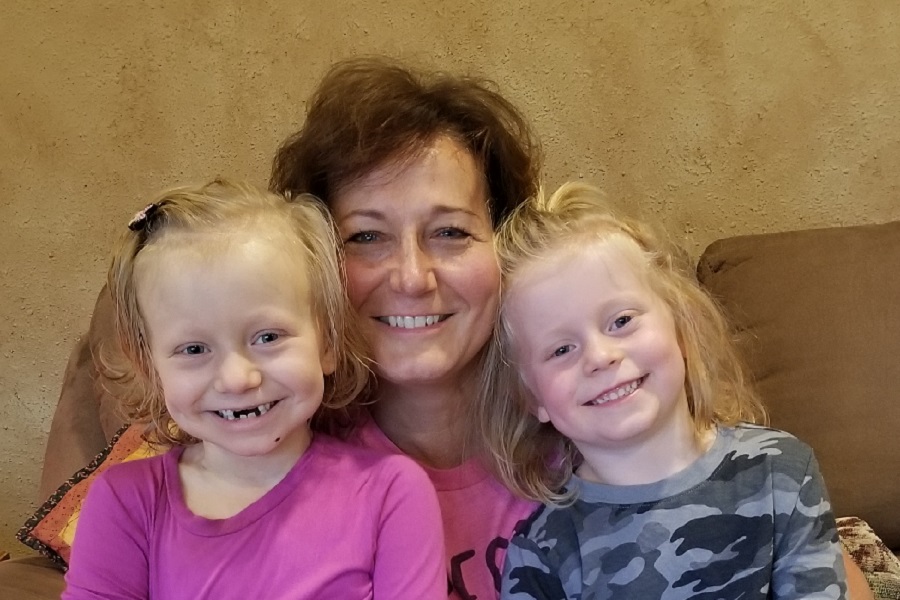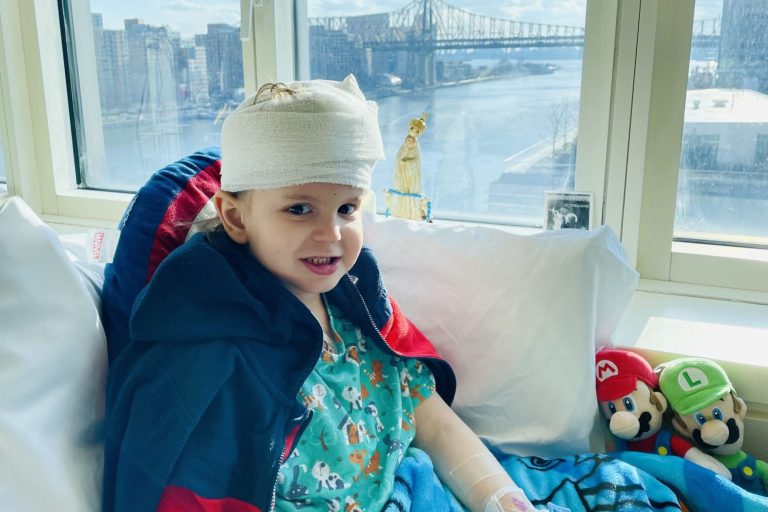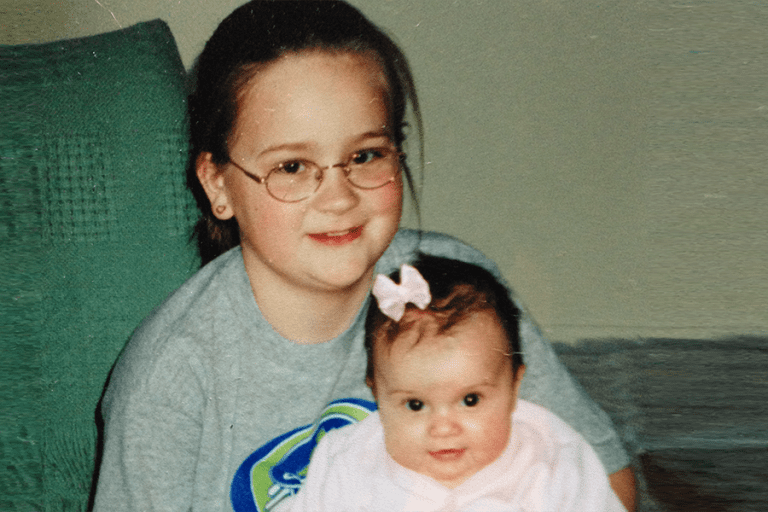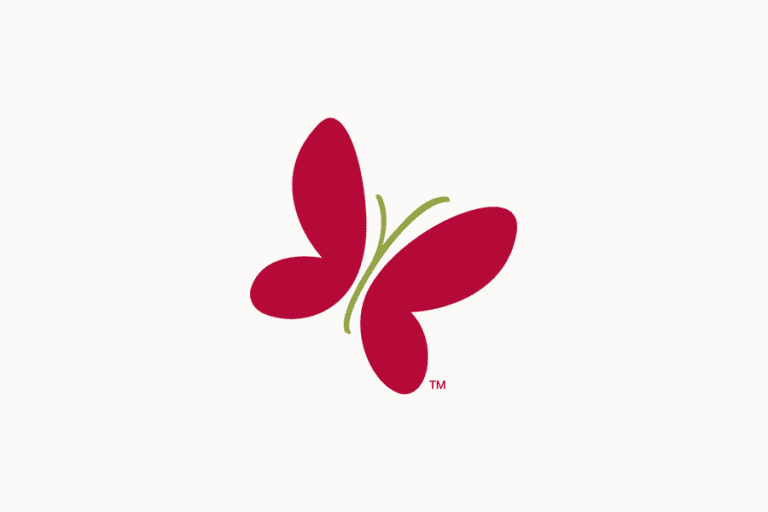A child’s cancer diagnosis sends a ripple effect through everyone who loves them – but when you’re a grandparent or other secondary caregiver of a child with cancer, it can be hard to balance your own emotions while remaining a steady source of support to those closest to the fight.
Cindy found herself in that situation when her granddaughter, Bella, was diagnosed with hepatoblastoma in 2017. She learned how to grieve the healthy childhood her granddaughter was losing while supporting her daughter, Tabitha, and son-in-law, Travis, through their cancer fight. CCRF asked her a few questions about being in this second ring of support – read her insightful answers below.
How did you react when you first found out that Bella had cancer?
I can recall the day like it was yesterday. Tabitha and Travis had taken Bella into our local clinic. When Tabitha called me, the tone of her voice made my heart sink.
“Mom, we have to go to Sioux Falls, they found a mass, they aren’t sure what it is.” Then, in almost a whisper, “It’s not good.” I slowly sank into the chair and took a deep breath before responding with the questions that flooded my mind. I tried to reassure her and remain optimistic. I also told her to cry, get it out, but when you get in the vehicle with Bella, no tears. Be strong for Bella.
My husband, Tim, and I got to the hospital to be with Travis and Tabitha during Bella’s biopsy. After a while, they were called back to talk with the surgeon. Then they said that six-letter word that changed our world: cancer. The world in that consult room stopped, no words, only soft sobs echoed in that room.
What was it like to watch your daughter receive such heartbreaking news?
We watched helplessly as Tabitha and Travis tried to make sense of this unfathomable news. I remember Tabitha and Travis first delegating phones calls to Tim and I, and then something happened with Tabitha – it was like she breathed in some unknown strength and courage. She decided she would do the necessary calls. From that moment, I truly believe God gave her undeniable strength, articulation and guidance.
You were right there alongside Tabitha through a lot of Bella’s treatment – what was that like?
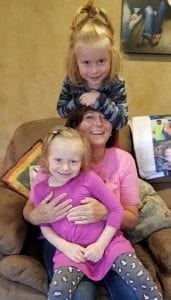
Cindy with Ian and Bella
I am truly blessed that Tabitha and I had a beautiful relationship before this journey started. This journey can bring such raw emotions to the surface. There were days that Tabitha was emotionally and physically exhausted as she navigated the barrage of doctor’s reports, tests and consoling a scared little Bella all while holding her head high and remaining outwardly strong. Phone calls to Travis to update him of all the reports and updates as he maintained his job at home were stabilizing and precious for both Tabitha and Travis. Tabitha knew I could handle the silence when she had nothing left. Short, sometimes snappy responses would go unnoticed as well. Sometimes, just a silent hug or a locked gaze across the room was all that we needed.
What is it like to watch not only your granddaughter suffer, but your daughter and son-in-law as well?
Watching Bella suffer was and is gut wrenching. Countless times, I prayed to take this journey as my own to spare her. But when I was with Bella and Ian (Bella's little brother), I was careful to tuck my emotions away for later. Once, Ian caught me with a tear in my eye and he so sweetly asked, “Mimi, why are you sad?”
Watching Tabitha and Travis navigate this journey has been difficult as well. As a parent, you want to “fix” their pain, but you can’t. Sharing our faith with them, spending time with them without talking about Bella’s journey every minute seemed to help.
I try to take notice when they are deflecting questions because they are still wrapping their heads around news just handed to them and give them time to “breathe.” It’s been challenging for me to watch people fall apart with news of Bella and expect Tab and Trav to console them. It’s crazy, and yet it happened again and again. People seemed to forget that they should be giving strength and encouragement to Tab and Trav. I respect Tab and Trav for their faith, strength and ability to handle those very unfair situations.
How do you balance your own emotions while also being there for your daughter and son-in-law?
I tried to remember, “What can I do to make this journey easier for Tab and Trav to handle?” and, “This is not about me.” At times, I’ve felt very isolated, because friends and families’ lives move forward, as they should, yet your world is in slow motion, and we are treading water. It’s sometimes difficult to reach out and call friends when you have been in this slow moving world. Sometimes a simple text or short phone call was amazing. I spend a lot of time in prayer – I don’t know what it would be like to navigate these journeys without prayer.
Where do you get your support and comfort when things get tough with Bella?
My husband, Tim, and I talk and pray about the situation at hand. I think about my Dad a lot. He died from liver cancer in 1998, two and a half weeks after his diagnosis. I thought that was the most difficult thing I would ever have to endure. I look back at it now and see how it actually has prepared me and strengthened me for Bella’s journey. I kept my focus on what I could do to lighten the load for Travis and Tabitha. “Whatever it takes” became my mantra. Trying to keep Ian content and keeping his life as normal as possible was top priority. Of course, I always try to be upbeat and loving to Bella. I’ve found a lot of peace just being alone in thought and prayer. It is so easy to say, “Hand it over to God, let it go.” It is far more difficult to actually do this and breathe a sigh of complete surrender.
What makes you the proudest when you think about how Tabitha and her family have come through the experience of childhood cancer?

Travis, Bella, Tabitha and Ian
I am so proud of Tabitha for finding the words to convey Bella’s journey on her Caring Bridge site and Facebook page. Her gift to write is so amazing! So many people feel like they are part of our family because of Tab’s candid writing. Travis found his faith a bit more, I believe. Their marriage has grown stronger and deeper. Their marriage was always a concern, knowing how journeys like this can tear people apart. I am thankful that our sons and Trav have such close relationships, almost like they are blood brothers. Of course, our sons keep a close watch on their sister as well. It is such a blessing to see your children love each other in such a beautiful way.
What do you see now when you look at your daughter and her family? How much has changed since Bella’s diagnosis?
When I look at Tabitha and her family, I see so much love. I see people that need to heal from the trauma of the journey. They realize they will always have one foot partially in the world of liver rejection, a cough, a fever that means more than it ever did 2 years ago. I see a family that is embracing life with new, purpose-filled eyes. They have seen how fragile life is and they know Bella could have been one of the children cancer took.
Has your experience with childhood cancer changed your outlook on life at all? Are there things you see differently than you did before?
I thought I had a lot of compassion before, but I think that has grown immensely. I’m more appreciative of time and moments spent with friends and family. I feel I listen more intently and ask more in-depth questions to Bella and Ian. I find that I recognize and avoid trivial talk and complaints in conversation with friends and on social media. I believe I am living life with more intense purpose and deeper love and gratitude. Above all, my faith was strong before, but now I feel like it has grown to new levels that I never imagined.
What would you say to other grandparents and other ‘secondary caregivers’ like you? What advice or words of encouragement would you give them?
Follow your heart. There is no manual to guide you. If you need support or guidance, don’t be afraid to reach out and get what help you need. Don’t make the parents or child with cancer feel like they need to console you. They need you to be strong and support them. Don’t be an extra burden to them and don’t expect things from them, they are on a fast-moving struggle bus with no brakes. Keep your energies, prayers and vibes all positive! Believe with all your heart and soul what you pray about and leave no room for worry or fear.
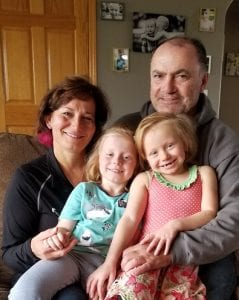
Cindy, Ian, Bella and Tim
Don’t forget to ask the parents how they are. Their heads are swimming with emotions, doctor’s consults, medicines, sometimes needing to have tough love with their very sick child. Listen to them. You can offer to sit with their child - however, because of the journey, they may have anxieties of leaving their child or the child may have anxieties - respect this. The parents don’t always want to talk about the cancer, respect that. Ask the parents how they are doing and wait for their honest answer. People often asked, “What can we do or what do you need?” The parents can’t even think straight, they don’t even know some days what they want. Just go ahead and grab a care package with items you know they like, or guess.
If there are siblings, don’t forget them. Ask them how they are doing, give them some fun things to do, maybe a special gift. They live in the shadows of their sibling and it can be lonely for them.
Here is the tough advice: Remember the parents may be edgy, short or curt. Try not to take it to heart. Give them space and love them unconditionally.
Knowing what you know now, what advice would you give to your past self?
Take one second at a time. Breathe. It’s going to hurt like nothing you’ve ever felt or experienced before. Your emotions and worries are going to be so split between Bella, Tab, Trav and Ian. Every single day, find something to be grateful for. Put on a happy face and have positive vibes, always. Believe and stay focused on their needs. Give yourself a little grace as well.
To learn more about Bella's journey, read Bella's Story - To Change the World.
You can support cures for kids like Bella
No child deserves to lose years of healthy childhood to cancer. Your support helps researchers find better treatments and cures so kids like Bella can defeat their disease and become healthy survivors.

